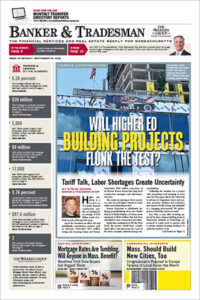Hub developers already have their hands full battling the recession.
Now they face another obstacle as well – mayoral politics.
As he cruises toward re-election, Mayor Thomas M. Menino is pursuing an artful strategy of clamping down early on any potential controversy that might attract unwelcome attention.
And in a city with a rich history of contentious development battles, that above all means keeping a lid on any potentially embarrassing neighborhood squabbles over new projects.
As a result, Hub developers face what amounts to a moratorium on any significant development decisions by City Hall from now until Menino is crowned again in November for an unprecedented fifth term.
The mayor’s apparent strategy is certainly a vote winner in Boston, where developers with grand new plans often generate heated neighborhood opposition.
The Pyramid Builder
Whether it’s a winner for the city’s long-term economic viability is another question, with a long list of major development issues in need of debate now, not later.
But once a fifth term is securely in his grasp, my prediction is a return of Menino’s alter ego, the would-be pyramid builder who gave us both an elegantly designed and successful convention center and the bold but arguably unrealistic plan for a 1,000-foot skyscraper.
That, in turn, could shift the balance of power back once again to those who want to add to Boston’s skyline.
“He does not want to have any group of people in a room who are unhappy,” said one local development industry executive of the mayor. “[Menino] is not going to let you push it. He controls the process. It’s his game.”
The mayor appears to take a different view.
“Of course I would disagree with every statement made in your e-mail,’’ writes Menino’s press secretary, Dot Joyce.
She pointed to the Charlesview housing project as an example of a potentially contentious proposal now under review by the city. Other big plans, including Harvard’s Allston complex and the Filene’s project, have fallen victim to the economy, she noted.
Alas, the mayor and I never connected directly, though we did play a couple rounds of phone tag.
The mayor’s crowd-pleasing neighborhood strategy can be traced back more than two years, to late 2006.
Rivals were starting to amass campaign war chests as a major weakness in the mayor’s political armor became apparent – a stubborn tendency to back controversial new development plans over neighborhood protests.
Would-be opponents likely saw in this an opportunity to seize upon these multiple neighborhood brush fires and fan the flames.
Whatever the motivations, Menino did something dramatic that now looks like a significant turning point – he pulled the plug on a controversial proposal by Suffolk University to build a student tower at the foot of Beacon Hill.
It was a significant flip-flop by the mayor, who, through the Boston Redevelopment Authority, the city’s development arm which he so carefully controls, appeared ready to ram this unpopular project down the gilded throats of the Beacon Hill elite.
Looking back, the rule book had changed overnight.
The mayor went on to tangle with Boston College over its expansion plans in Brighton, currying favor among neighborhood voters at the expense of an institution that is a significant local economic driver.
The BRA also pushed back against unpopular development plans in the Fort Point channel, and the mayor himself at a press conference this spring reversed course on a crowd pleasing but financially flawed proposal for a giant, nonprofit arts complex in Roxbury.
Elma Lewis Partners missed a key city financing deadline for their proposed, $400 million museum and commercial complex in Roxbury, but had rallied local support.
The People’s Mayor?
Meanwhile, when the economy began to slow and plans to redevelop the Filene’s project stalled, leaving a messy, half completed demolition site in the heart of Downtown Crossing, Menino took the populist route once again.
Instead of scrambling for dollars, his initial reaction was to float plans to crack down on supposedly wayward developers.
And the economy has also provided a helping hand, putting Harvard’s perennially controversial expansion into Allston on hold and forcing onto the back burner a proposed tower that would have loomed over beloved Copley Square.
You can say what you want about the economics of all this, but the mayor appears to have struck electoral gold.
Menino’s approval ratings are sky-high and there are no major development controversies for his opponents to latch onto.
And when signs of smoke do appear, Menino is ready to rush in and douse the flames. Just witness the rapid loan of $10 million to the new W Hotel and condo high-rise in the Theater District, which prevented a potentially embarrassing collapse of the project just months before it was slated to open.
Stuck In Neutral
Yet while this may be grand politics, it means a range of worthy development projects across Boston will be stuck in the shadows, at least for a few more months, anyway. And that’s too bad.
The recession may be brutal, but this is just the time for developers to work out the kinks in order to push ahead when the economy, as it will, picks up over the next few years.
Instead of happy talk press releases, there should be a real debate now rather than later whether an expansion of Boston’s convention center is needed or whether that Roxbury development plan is truly workable – or just a pipedream.
The danger is all these issues are simply getting punted down the line, to be debated en masse just as the recovery begins to take hold.
But by then, the mayor will be well into his fifth term.
And my bet is the folksy, neighborhood defender, while always part of the Menino persona, will share the stage once again with the grand builder, the guy who likes to unveil major development ideas at the drop of a hat.






